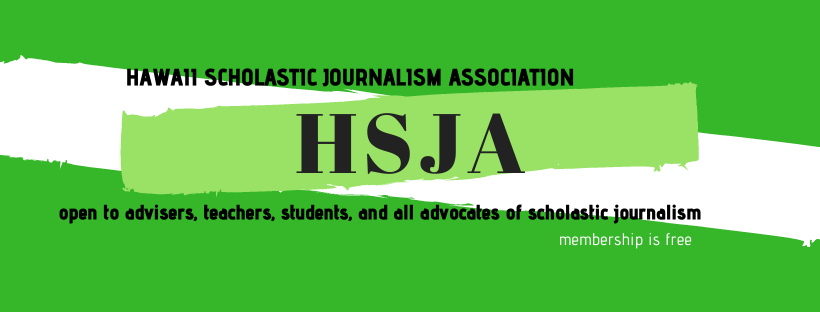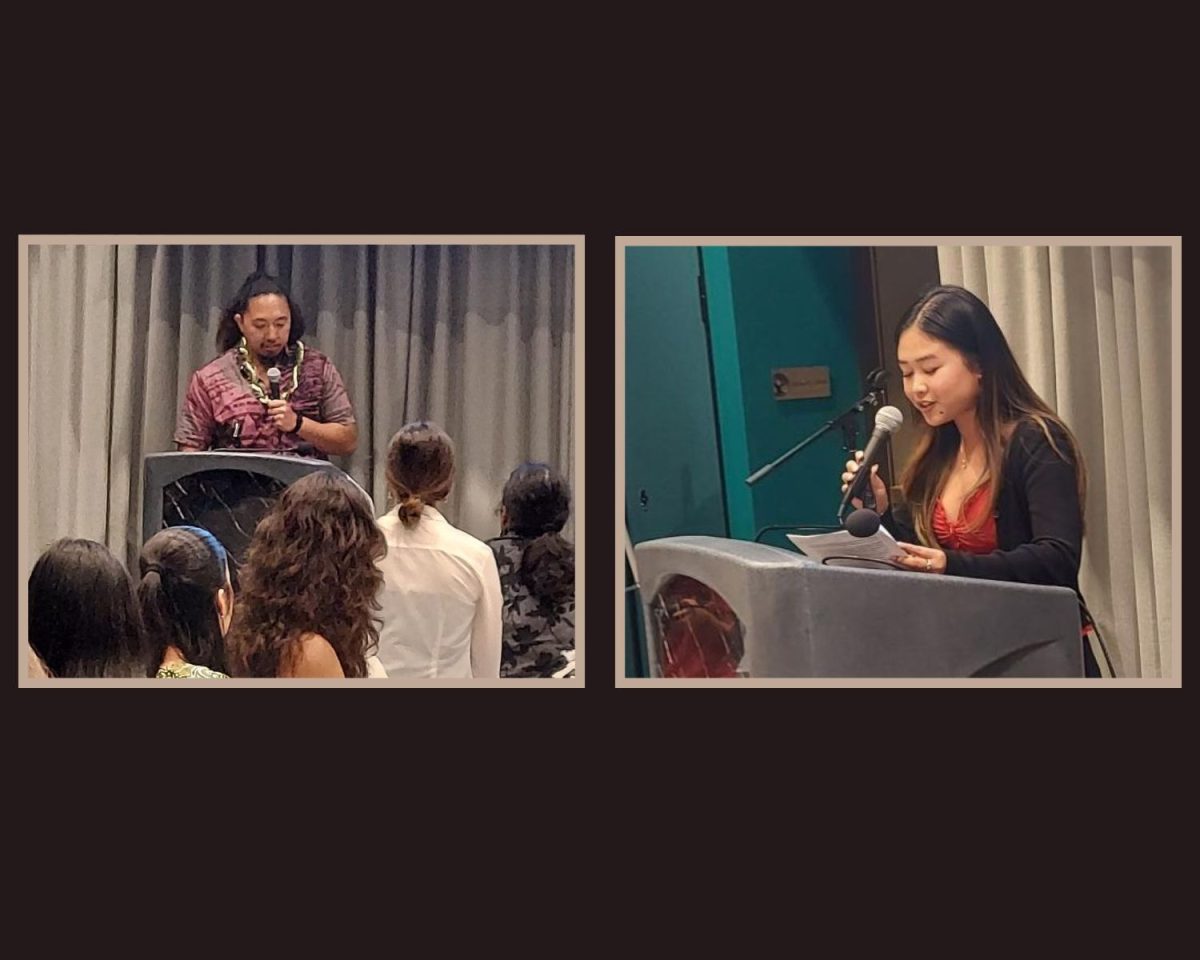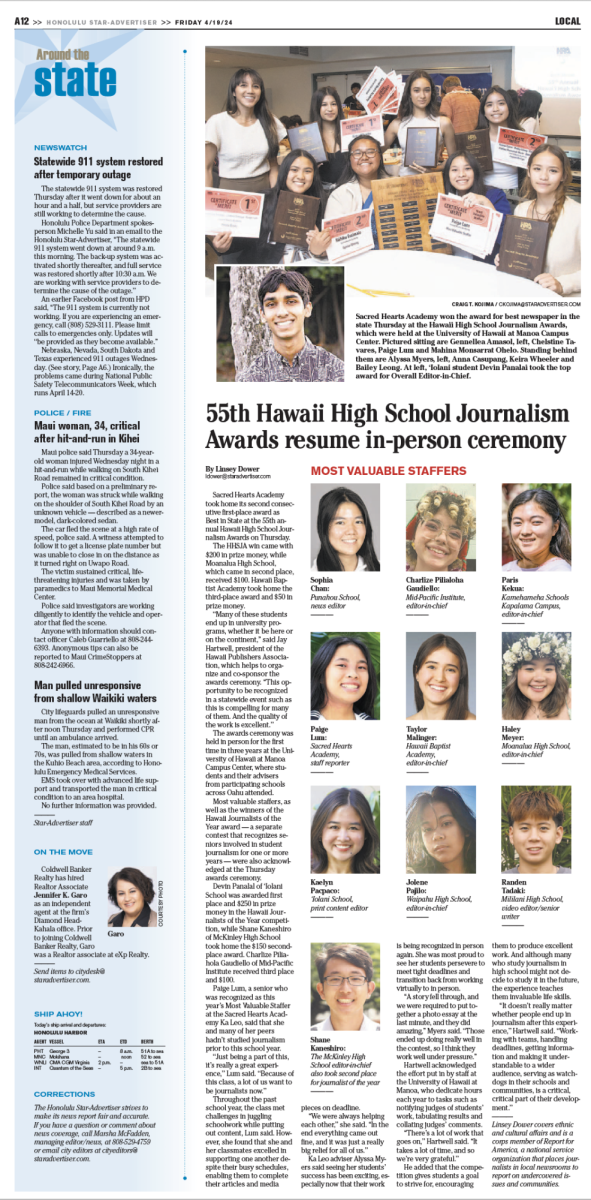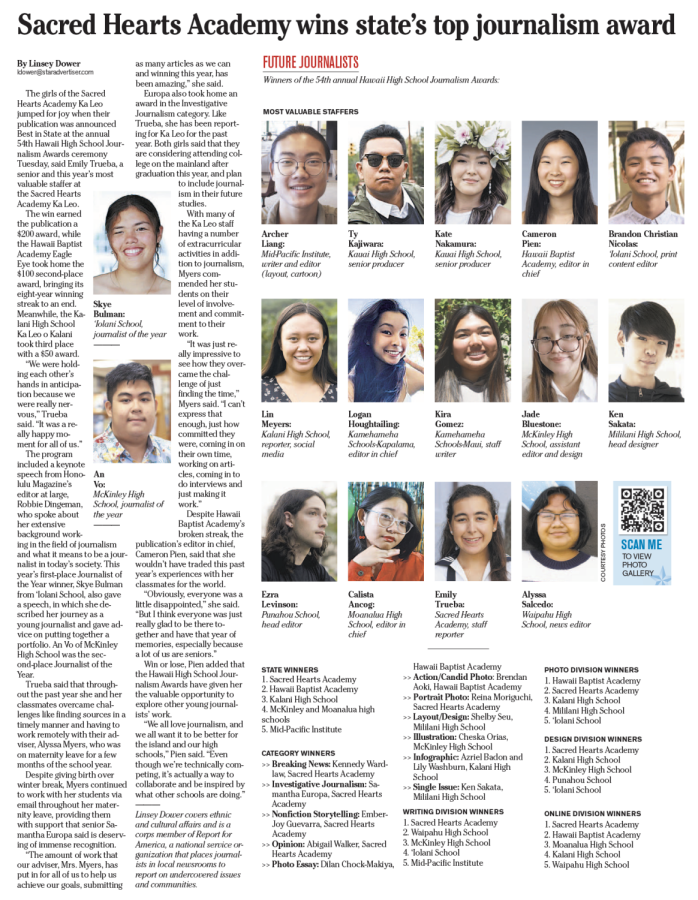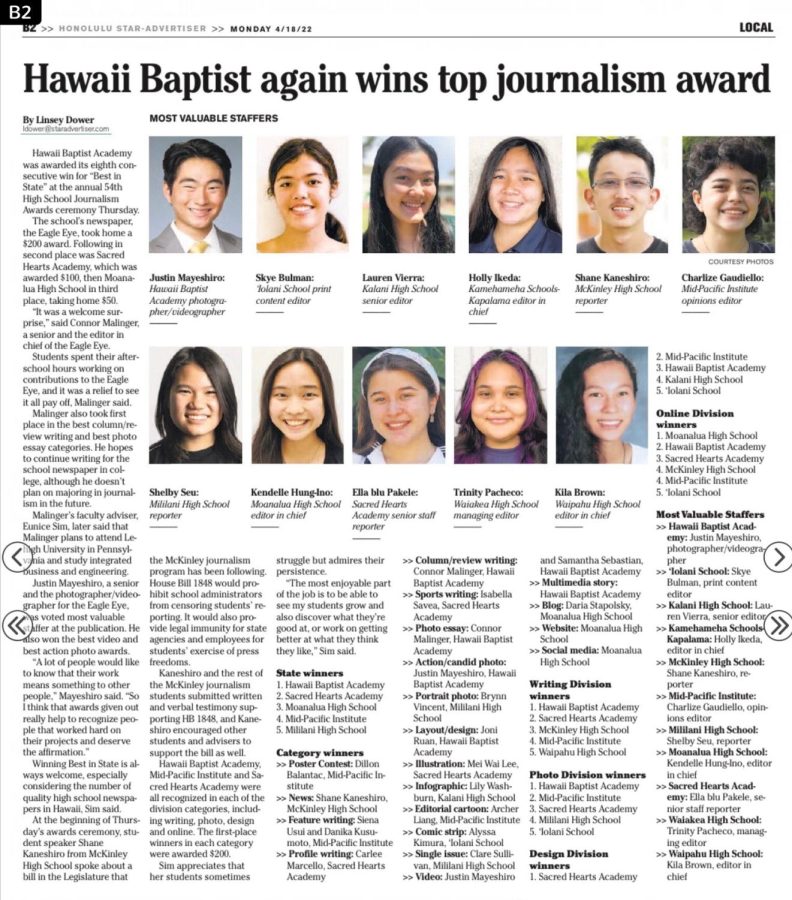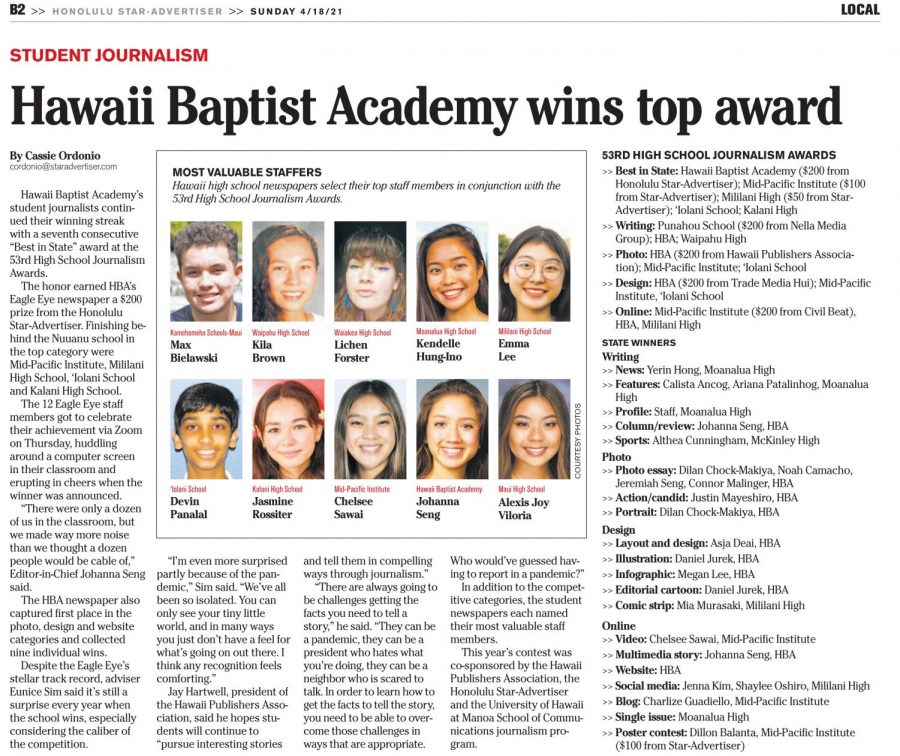Speakers at the 55th Hawaii High School Journalism Awards luncheon were Shane Kaneshiro, a student at McKinley High School, and Noelle Fujii-Oride, a writer and engagement editor at Hawaii Business Magazine.
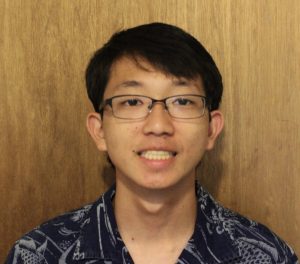 Shane Kaneshiro placed second in the 2024 Hawaii Journalist of the Year contest, sponsored by the Hawaii chapter of the Asian American Journalists Association. Devin Panalal of Iolani Schools placed first and competed in the national Journalism Education Association’s Journalist of the Year contest. The HiJOY winner usually speaks at the spring Hawaii High School Journalism Awards luncheon. Panalal could not attend and so Kaneshiro spoke.
Shane Kaneshiro placed second in the 2024 Hawaii Journalist of the Year contest, sponsored by the Hawaii chapter of the Asian American Journalists Association. Devin Panalal of Iolani Schools placed first and competed in the national Journalism Education Association’s Journalist of the Year contest. The HiJOY winner usually speaks at the spring Hawaii High School Journalism Awards luncheon. Panalal could not attend and so Kaneshiro spoke.
My name is Shane Kaneshiro and I am a 4th year journalist at McKinley High School.
Competing in the Journalist of the Year contest is an accomplishment in itself, seeing all the memories and challenges accomplished up until now in one portfolio, but I am also proud to now be connected through this experience with past, present, and future JOY competitors. Underclassmen, as future student journalists taking over, I encourage you to compete when you are a senior. Find inspiration from past JOY competitors to strengthen and build your portfolio.
Today, we are here at this luncheon to compete and celebrate our accomplishments but most importantly, to connect and showcase the stories we are conveying to our community.
Journalism as a form of storytelling goes far back. For some of our newspapers, it goes back to the beginning of the school, connecting us to the lives of those who came before us and the problems they faced, voicing those concerns and bringing awareness.
The journalism we have produced within the last few years will connect those after us to the extraordinary experiences we have had.
For all those in the room, especially the students, we had to experience the pandemic together, online for the first time and for us seniors, we entered high school as freshmen, distancing ourselves from others. As journalists, interviewing and learning became a challenge, but we overcame them. For me, finding ways to interview came in many forms. Using google meets, email, and even discord DM.
But this strengthened us, giving us resources and creative ways to find that gem to share and connect with the community.
We are all in different schools but it doesn’t mean we have to always be separate until today.
We can connect on many levels, to having committees to bring ideas to different schools and within the past two years, legislation passed, to protect student journalists but it still needs to be implemented into the BOE policy.
There are also opportunities to connect farther afield. I had the opportunity to travel to Washington D.C. Twice, covered by the organization to represent Hawaii for the AAJA and the Al Neuharth Journalism Convention. While at those conventions, we all came from different parts of the nation but one thing connected us, we had a purpose, to learn and convey the story to everyone.
So for all of us here in Hawaii, it is not much different.
In this way, we, in our own schools, state and world, can come together as a community in journalism. we will not just benefit ourselves, we will benefit the entire journalism community.
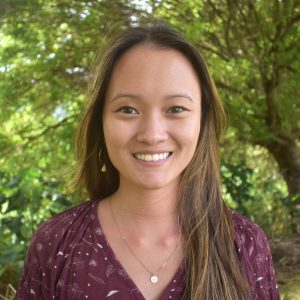 Keynote speaker Noelle Fujii-Oride is a writer and engagement editor at Hawaii Business Magazine. Her explanatory-style feature stories cover the big issues impacting Hawai‘i, such as affordable housing, cost of living issues, tourism, education and construction. She also leads the magazine’s engagement efforts, which aim to build relationships with new readers and make the publication’s reporting processes more transparent. Noelle grew up in the Bay Area and now lives on Kaua‘i. In her spare time, she volunteers with the Asian American Journalists Association, a nonprofit dedicated to advancing diversity in newsrooms and ensuring fair and accurate coverage of communities of color. She was part of AAJA’s 2022 Executive Leadership Program for mid- to senior-level journalists, as well as its 2016 multimedia journalism fellowship for college journalists. Prior to joining Hawaii Business Magazine as a staff writer in 2017, Noelle held internships at the magazine, the Honolulu Star-Advertiser and Honolulu Civil Beat. She majored in journalism at the University of Hawai‘i at Mānoa and served as the editor-in-chief of its campus newspaper, Ka Leo O Hawai‘i.
Keynote speaker Noelle Fujii-Oride is a writer and engagement editor at Hawaii Business Magazine. Her explanatory-style feature stories cover the big issues impacting Hawai‘i, such as affordable housing, cost of living issues, tourism, education and construction. She also leads the magazine’s engagement efforts, which aim to build relationships with new readers and make the publication’s reporting processes more transparent. Noelle grew up in the Bay Area and now lives on Kaua‘i. In her spare time, she volunteers with the Asian American Journalists Association, a nonprofit dedicated to advancing diversity in newsrooms and ensuring fair and accurate coverage of communities of color. She was part of AAJA’s 2022 Executive Leadership Program for mid- to senior-level journalists, as well as its 2016 multimedia journalism fellowship for college journalists. Prior to joining Hawaii Business Magazine as a staff writer in 2017, Noelle held internships at the magazine, the Honolulu Star-Advertiser and Honolulu Civil Beat. She majored in journalism at the University of Hawai‘i at Mānoa and served as the editor-in-chief of its campus newspaper, Ka Leo O Hawai‘i.
© Copyright 2024 by Noelle Fujii-Oride
Like many of you in this room, my interest in journalism was nurtured at my high school newspaper. Though, I had a bit of a rocky start.
For my first year, I was the only sophomore among upperclassmen, and I was so shy. Most of my memories from that year are actually of me sitting by myself, and it felt like the only time I talked in that class was when I had to discuss edits.
Now that I look back at that time, it’s kind of ironic. A quiet, timid girl wanted to be a journalist even though that would require me talking to lots of people.
But that class brought me out of my shell. Over time, I grew more comfortable talking with my classmates and with sources. And two years later, I was selected as editor-in-chief. I was still soft-spoken, but I gained confidence as I ran meetings and worked with reporters.
When I graduated, my newspaper advisor gave me a card that said: “Congratulations on graduating. I admire your quiet determination.”
It was the first time I thought of myself that way, and although it’s been over a decade since I received that card, being quietly determined continues to define me. It’s also helped me get into the local journalism industry and stay in it.
I grew up in the Bay Area but decided to attend UH Mānoa so I could study journalism and work for the campus paper. And from the beginning, I knew getting a job would be tough. Toward the end of my freshman year, I emailed my hometown’s newspaper to see if they were looking for interns. I never heard back.
I had more luck my sophomore year. The editor of Hawaii Business Magazine, where I now work, was looking for interns and asked Ka Leo’s advisor for recommendations.
At the time, I just wanted experience. I didn’t care where or what I’d be doing. So imagine my shock hearing that the editor of a business publication was willing to take a chance on me. I had no experience with business reporting, I didn’t take any business classes, and I barely remembered what I learned about economics in high school.
But being open to that opportunity helped me build essential skills applicable to any type of journalism. I got lessons in interviewing business owners and executives, digging through data, how to check with sources that I was accurately interpreting their numbers, and, ultimately, how to cover complicated topics in a way that’s interesting to everyone.
After I graduated, I was set on getting a job within a year. Too many of my classmates ended up pursuing other careers because the local job market was too tough. Though, I have to admit, there were several times I thought I’d have to throw in the towel.
It’s expected that you’ll face rejection at some point when you apply for jobs. It doesn’t mean it stings any less. That summer and fall, I applied, unsuccessfully, for several openings. One was for a daily paper and needed someone with more experience. Another was worried that I was too accustomed to longer magazine deadlines and wouldn’t be able to meet their tight timelines.
I was discouraged. I ended up reaching out to the editor at Hawaii Business on a whim. I wanted to ask for a letter of recommendation, but he wanted to talk about his open writer position because he was willing to work with a recent graduate.
My career has been defined by my desire to learn and a drive to find or create opportunities for myself.
With the increase in online resources over the last several years, I’ve been able to learn about trauma-informed and sensitive reporting practices, how to accurately capture and incorporate context when covering conflicts, how to engage readers, and how to improve my storytelling.
One program was about covering private equity, a type of investment firm typically known for aggressively extracting profits from the companies it invests in.
That program had a grant opportunity attached to it. I pitched my idea to investigate private equity’s presence in Hawai‘i’s hotel industry, thinking it was a long shot. But my project was one of three that received a grant.
The grant organization paired me with an investigative reporter in California to coach me. And thank goodness they did that. Remember how I said I felt intimidated when I first started interning at the business magazine? Yeah, I still haven’t taken any business classes, and I never imagined I’d be covering private equity. In fact, that was the type of topic I was determined to stay away from.
I spent five months working on that project, and I questioned myself almost every step of the way. Why was I the one telling this story when I had no experience covering the capital markets? How the heck was I even qualified to tell this story? And how do I even find the information I need?
However, that reporter helped me develop a process to dig through public records and coached me through finding sources and getting people to talk. His mentorship helped me build confidence in myself and reminded me that even though private equity was a new topic, I had the skills and determination to get the job done.
In the end, my article was published in December, and it’s the first to provide an accounting of private equity’s presence in our hotel industry. It’s not perfect, but I’m proud of it and how much I grew from working on it.
Another opportunity stemmed from watching the racial reckoning that has been occurring in newsrooms around the country. As a journalist of color, I’ve been captivated by national discussions about how journalism can uphold systemic discrimination and racism, or help dismantle our society’s unjust structures.
In 2022, I was accepted into the Asian American Journalist Association’s Executive Leadership Program, where I met editors and reporters from around the country. We learned how to better describe and lean into our unique identities and how leadership styles vary across cultures. We also heard inspiring stories from veteran journalists who were sometimes the first or only journalists of color in their newsrooms.
This program helped me see myself as a leader. I was no longer quiet in staff meetings, and I became more comfortable directly communicating my ideas and suggestions to do things differently than we had in the past.
It also helped me find my voice in my fight for advancing newsroom diversity and more equitable and sensitive reporting of and within marginalized communities.
You know, I was just reading an article in Harvard Business Review about disrupting a system that was built to hold you back. The author, who is an Asian American professor, said there’s often expectations for Asian American women like us to be non-confrontational and docile – that we’d just go along with whatever is happening around us in our lives and careers. But speaking up or doing things differently than what’s expected of us is not something we should have to apologize for.
You’ll often hear that you need a thick skin to be a journalist. Dealing with intimidating experiences is one part of it, but the other is that there will be times when you upset sources or readers, or get negative comments about your work.
When I first started at the magazine, I worked on a story about a structure being rebuilt in a culturally sensitive area. However, some parts of the surrounding community didn’t want that project rebuilt.
I remember I talked with opponents about their concerns and then asked the developers their response on those comments. The conversation basically ended with the developers threatening to get their lawyers involved to make sure my article was accurate – meaning that it would portray their efforts in a positive light.
That was the first time I had a source directly angry at me. I still remember my voice shaking when I called my editor to explain what happened and ask him what to do because I genuinely thought I messed up. But my editor said it was no big deal and that angering sources is going to happen from time to time, especially when you have to ask tough questions.
More recently, my editor and I received comments from a couple of readers expressing their disappointments about something I wrote. They had comments like “please be more selective in who you hire as a reporter” and “your readers will choose to no longer look to you as a resource for factual information.”
It stung to see those comments, but, I consulted my colleagues, and they reminded me that nothing I wrote was inaccurate – and it was clear that the readers didn’t actually read the article.
As you go through your career, it’s important to find those colleagues and mentors who you can lean on to stay grounded in tough situations.
People often ask me why I stay in journalism knowing the state of the industry. And I tell them it’s because journalism is an extremely fulfilling career. I’ve been able to learn so much about how our world works, and I love being able to pass on those learnings to readers in the hopes that they’ll gain a better understanding or consider a different perspective.
I’m not going to lie, those of you who want to go into journalism have a long road ahead of you. With the industry shrinking and the trend towards low-effort, high quantity content, it’ll take determination and perseverance to get into it – and provide quality work that helps the community. But it is possible.
My advice to you is take advantage of any opportunities you have to gain experience and improve your skillset. You’re already on a good start by writing for your school papers.
Also, find people who can act as your cheerleaders. Journalism can be stressful and frustrating, but you will always be thankful to have people in your corner. Plus, you never know when you’ll need them to write you a letter of recommendation or help introduce you to a new opportunity.
And, finally, don’t shy away from things that intimidate you. There will always be sources or topics that will push you outside of your comfort zone. Those experiences will help you grow the most, and even though they may be tough to get through, they’re also the most rewarding.
Thank you.

